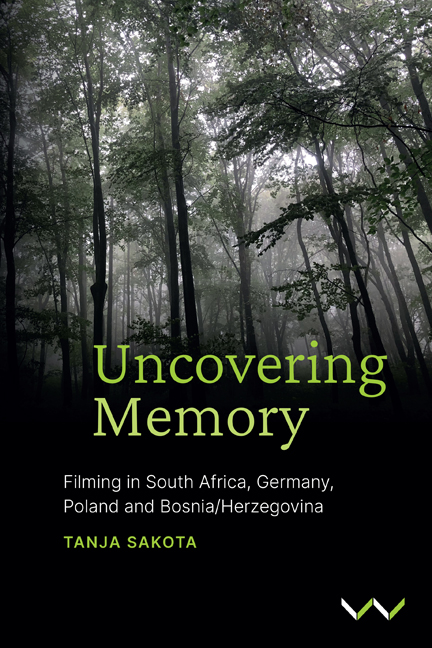Book contents
- Frontmatter
- Dedication
- Contents
- List of Images
- Foreword
- Acknowledgements
- Map of Africa and Europe
- Practice-Based Research, Teaching and Learning
- Part I Working With Students: Cape Town, Johannesburg, Berlin
- Part II Working With Peers: Constitution Hill, Johannesburg
- Part III Working With Myself: Poland, Germany, Bosnia/Herzegovina, South Africa
- Moving Forward
- Film Credits
- Glossary of Terms
- Notes
- Bibliography
- Index
Chapter 10 - Memory through site-specific research: a discussion post-practice
Published online by Cambridge University Press: 24 November 2023
- Frontmatter
- Dedication
- Contents
- List of Images
- Foreword
- Acknowledgements
- Map of Africa and Europe
- Practice-Based Research, Teaching and Learning
- Part I Working With Students: Cape Town, Johannesburg, Berlin
- Part II Working With Peers: Constitution Hill, Johannesburg
- Part III Working With Myself: Poland, Germany, Bosnia/Herzegovina, South Africa
- Moving Forward
- Film Credits
- Glossary of Terms
- Notes
- Bibliography
- Index
Summary
HISTORY: THE WRITTEN FACTS
One could define history as the official record or description of events. If one were to look only at the last hundred years, it is quite evident that recorded ‘history’ shifts and changes. Historiography is part of a complex discourse involving social, cultural and political debates around memory and interpretation of facts. Winston Churchill wrote that ‘history is written by the victors’, confirming that history is a one-sided ‘official’ record of events. A visit to the Apartheid Museum in Johannesburg, South Africa,1 demonstrates the discrepancy between the official and the unofficial versions of events. It is important to emphasise that official and unofficial history are affected by the memory of the past, who remembers and how we remember. Culture and cultural artefacts such as monuments and memorials become part of the process of this interaction.
There is an implied difference between monument and memorial. A monument is a structure, building or statue that commemorates an individual or group of individuals. It is built to commemorate a victory. This differs from a memorial, which is a structure, building or statue that commemorates an event or the individuals involved in an event who have been defeated and are dead (Koshal 2011). I would call for a more fluid interpretation that aligns more with how we remember things. One cannot negate that some monuments are also memorials (the Rhodes Memorial on Devil's Peak in Cape Town, or a gravestone on someone's final resting place, for example).
Schmitz's die sechste million (Schmitz 2018), Krachz (Grählert 2019) and Books (Munoz 2019) construct their narratives around memorial spaces. Both the Holocaust Memorial and The Empty Library memorial are also counter-monuments. The film die sechste million aims to remember what happened to the victims who were murdered by the Nazis. It does this with an element of respect for the space and its memory, and this emerges subtly as we move through the corridors of the concrete cuboids. Krachz and Books both focus on the book-burning but through the stories of their characters. Krachz refers to actual people, Erika Mann and Pamela Wedekind, who were affected by the event. Books speaks about the relevance of books in our lives through the voiceover, which is contrasted with the images of the empty bookshelves below.
- Type
- Chapter
- Information
- Uncovering MemoryFilming in South Africa, Germany, Poland and Bosnia/Herzegovina, pp. 135 - 144Publisher: Wits University PressPrint publication year: 2023



